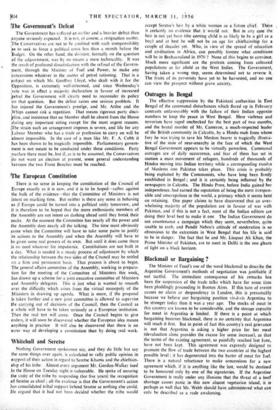The European Constitution
There is no sense in keeping the constitution of the Council of Europe exactly as it is now, and it is to be hoped—rather against the bulk of the evidence—that the Committee of Ministers is not intent on marking time. But neither is there any sense in behaving as if Europe could be turned into a political unity tomorrow, and it is therefore to be hoped that the more enthusiastic members of the Assembly are not intent on dashing ahead until they break their necks. At the moment the Committee has nearly all the power and the Assembly does nearly all the talking. The time must obviously come when the Committee will have to take some pains to justify its actions to the Assembly and when the Assembly will have to be given some real powers of its own. But until it doei come there is no need whatever for impatienCe. Constitutions are not built in a day. What is needed is a steady process of adjustment by which the relationship between the two sides of the Council may be settled on a firm and permanent basis. That process is about to begin. The general affairs committee of the Assembly, working in prepara- tion for the meeting of the Committee of Ministers this week; has drawn up a scheme for a joint. executive committee of Ministers and Assembly delegates. This is just what is wanted to smooth over the difficulty which arises from the virtual monopoly of the Ministers in drawing up agenda. What is more, if the proposal is taken further and a new joint committee is allowed to supervise the carrying out of decisions of the Council, then the Council as a whole will have to be taken seriously as a European institution. Then the real test will come. Once the Council begins to give Orders, it will soon be discovered whether the European idea means anything in practice. It will also be discovered that there is no surer way of developing a constitution than by doing real work.






































 Previous page
Previous page